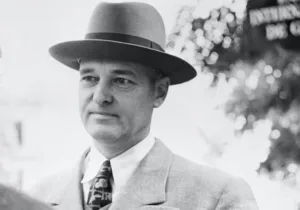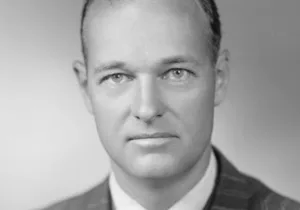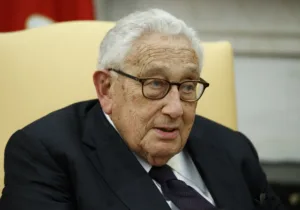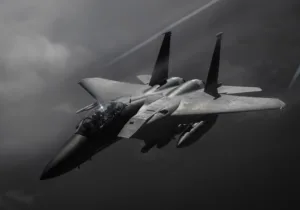Every couple years a supposedly new revelation claims Nixon sabotaged a possible Vietnam peace settlement by LBJ during the 1968 election by secretly promising South Vietnam a better deal under his presidency. The latest was a New Year’s Eve New York Times column headlined “Nixon’s Vietnam Treachery.”
According to this often recycled storyline, LBJ was anxiously exploiting an opening for peace with North Vietnam at Paris talks, for which he dramatically announced a halt in USA bombing of North Vietnam in the final days before the presidential election between Humphrey and Nixon. But Nixon, fearing a last minute peace gambit would elect Humphrey, treasonably dissuaded South Vietnam through his Chinese American supporter Anna Chennault, sometimes called The Dragon Lady, whose intervention was detected for LBJ through FBI and NSA eavesdrops. The peace initiative failed without South Vietnamese support, Nixon was narrowly elected, and the war tragically continued for another four years.
As an aside, Madame Chennault, who’s now age 91, was the widow of the much older USA WWII General Claire Chennault, who commanded the legendary Flying Tigers supplying China against the Japanese. When I was growing up, our neighbor was a Flying Tiger vet, and the real estate agent who sold my parents our home had boasted of the legendary Madame Chennault visiting next door. In the 1990s the Dragon Lady, evidently loyal to her late husband’s men, attended our neighbor’s funeral at the nearby Catholic Church.
Reputedly Chennault, during her work for Nixon in 1968, was romantically tied to former FDR aide Tommy Corcoran, who was friends with LBJ and whose law partner managed Humphrey’s presidential campaign, likely offering LBJ another window into Nixon’s machinations. Meanwhile, the Nixon camp, which assumed an 11th hour LBJ trick to tilt the election, had a secret source inside the LBJ White House. Plus Henry Kissinger, who had advised the Johnson Administration on Vietnam, was also feeding intelligence to the Nixon camp. Both LBJ and Nixon warily suspected skulduggery from the other.
Amid all these intrigues, there was no real chance of any real Vietnam peace agreement in 1968. North Vietnam would settle for nothing less than virtual USA surrender of South Vietnam. It never responded to unilateral concessions, like bombing pauses, with anything other than contempt. In 1972 it would only reluctantly relent to a flawed peace deal after Nixon’s controversial and intense Christmas bombing of Hanoi. South Vietnam, without Madame Chennault, well knew on its own that Nixon would likely be friendlier to its interests than Humphrey. Meanwhile the Soviets apparently were pushing the North Vietnamese to feign interest in peace so as to help Humphrey.
LBJ was the least naive of anybody and almost certainly expected little to nothing of peace talks, had been reluctant to accede to a bombing halt or any other slowdown in his war, and understood his announcement of a bombing pause right before the election only had the purpose of electing his Vice President over Nixon. Cynically but privately, LBJ complained of Nixon’s “treason” while knowing his allegation, which reached Nixon, was meant to intimidate. After the election, LBJ complained to Nixon of the “sordid story,” but didn’t press the point, as both agreed to collaborate in the transition. LBJ often doubted Humphrey’s strength, especially on Vietnam, while sometimes respecting Nixon’s, so his reaction to Nixon’s victory was privately mixed.
Nixon and LBJ were longtime frenemies, dating to the 1940s in Congress, and accelerating in the 1950s when LBJ was Senate Majority Leader and Vice President Nixon presided over the Senate. For decades, as Machiavellians and hard nosed practitioners of realpolitik, they admired, opposed, understood, resented, distrusted, respected, threatened and relied on each other. Neither had punctilious political morals, though Nixon was often more awkward in his shenanigans perhaps due to his latent Quaker conscience. Nixon was sneaky, while LBJ was flamboyantly manipulative.
During the 1968 campaign, Nixon dispatched their mutual confidant, Billy Graham, to assure LBJ that if elected as president Nixon would respect LBJ’s legacy, to which LBJ listened closely and appreciatively, if also suspiciously. Graham, almost certainly not as naive or clueless about either as he would later profess, was close to both partly because he intuited in both, despite their selfserving rituals and chicanery, a deep commitment to the country and to the survival of democracy in a hostile world.
In a phone chat during the Summer of 1968, after Nixon secured the GOP nomination, LBJ invited him to visit his Texas ranch for a special Vietnam briefing, telling him by phone:
We’re both supposed to be great political animals, but we both want to do what’s best for our country [which Nixon acknowledged], and I think it’s awfully important, dealing with these Commies for the next four months for us to be completely informed with the same facts and then we can do whatever our judgment dictates.
During Nixon’s presidency, the two men periodically, through proxies and innuendo, threatened each other with blackmail and public exposure, while their mutual regard was little diminished. After his election, Nixon was told by J. Edgar Hoover that LBJ had ordered the FBI to bug Nixon’s campaign plane in response to the Chennault affair, supposedly enraging Nixon. Purportedly Hoover actually fabricated this claim to intimidate Nixon, for his own job insurance, but Nixon reportedly always believed the story. Still, honoring his commitment via Graham, Nixon kept LBJ informed of Vietnam negotiations, phoned him right before LBJ’s death with the near final word on the peace settlement, and credited LBJ’s legacy in the final announcement of the deal with Hanoi.
LBJ essentially lost the presidency over his determination to avoid defeat in Vietnam, while Nixon ironically, more indirectly, experienced the same virtual fate. They both effectively sacrificed themselves in defense of South Vietnam, which was lost despite their exertions. Yet their mutual commitment to defending democracy against the Soviet bloc was ultimately vindicated by the Cold War’s successful and peaceful conclusion, for which they merit some credit.
The LBJ/Nixon rivalry/collaboration, especially in the endlessly distorted and exaggerated Chennault affair, also illustrates the constant need for looking beyond superficial appearances in search of deeper understanding about political currents and global statecraft. Sometimes even seemingly sordid stories disguise loftier purposes and even providential designs.






